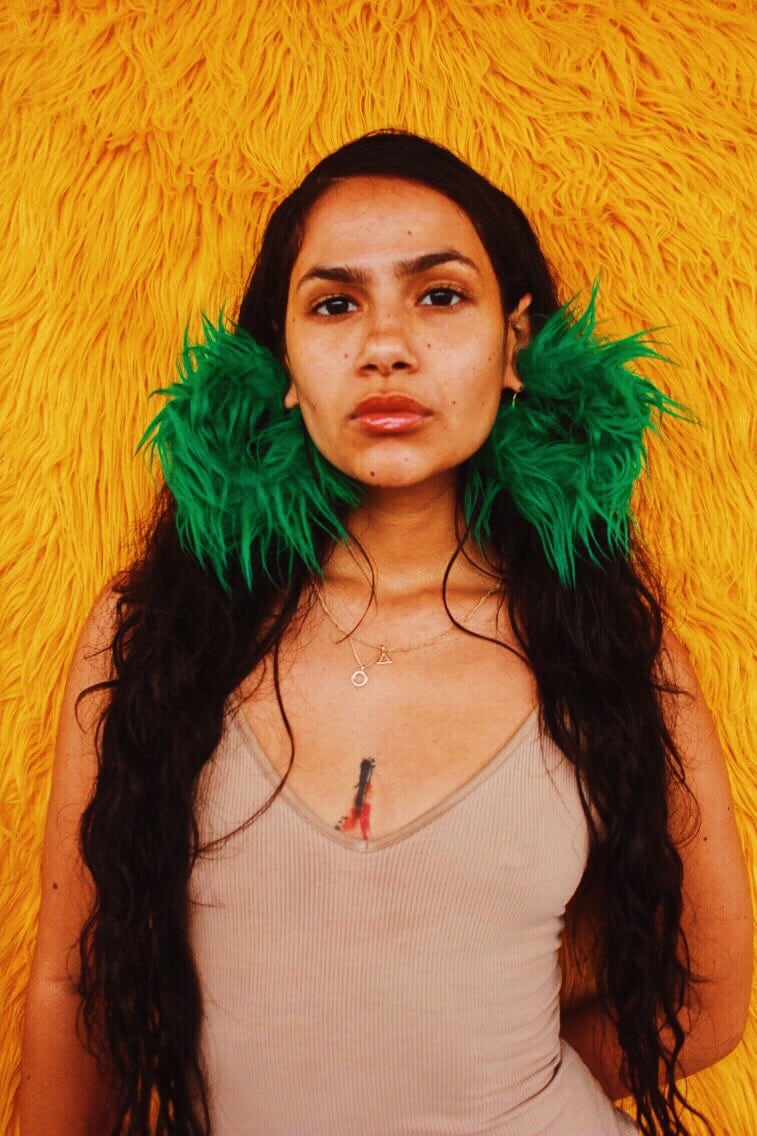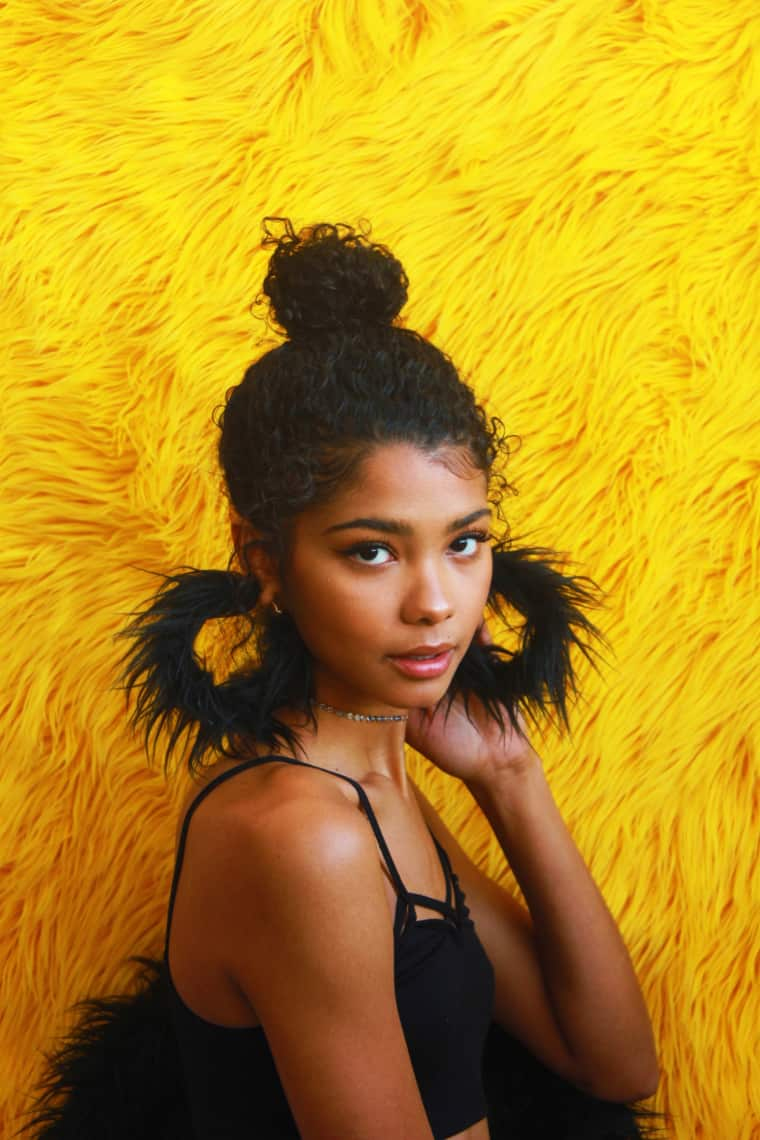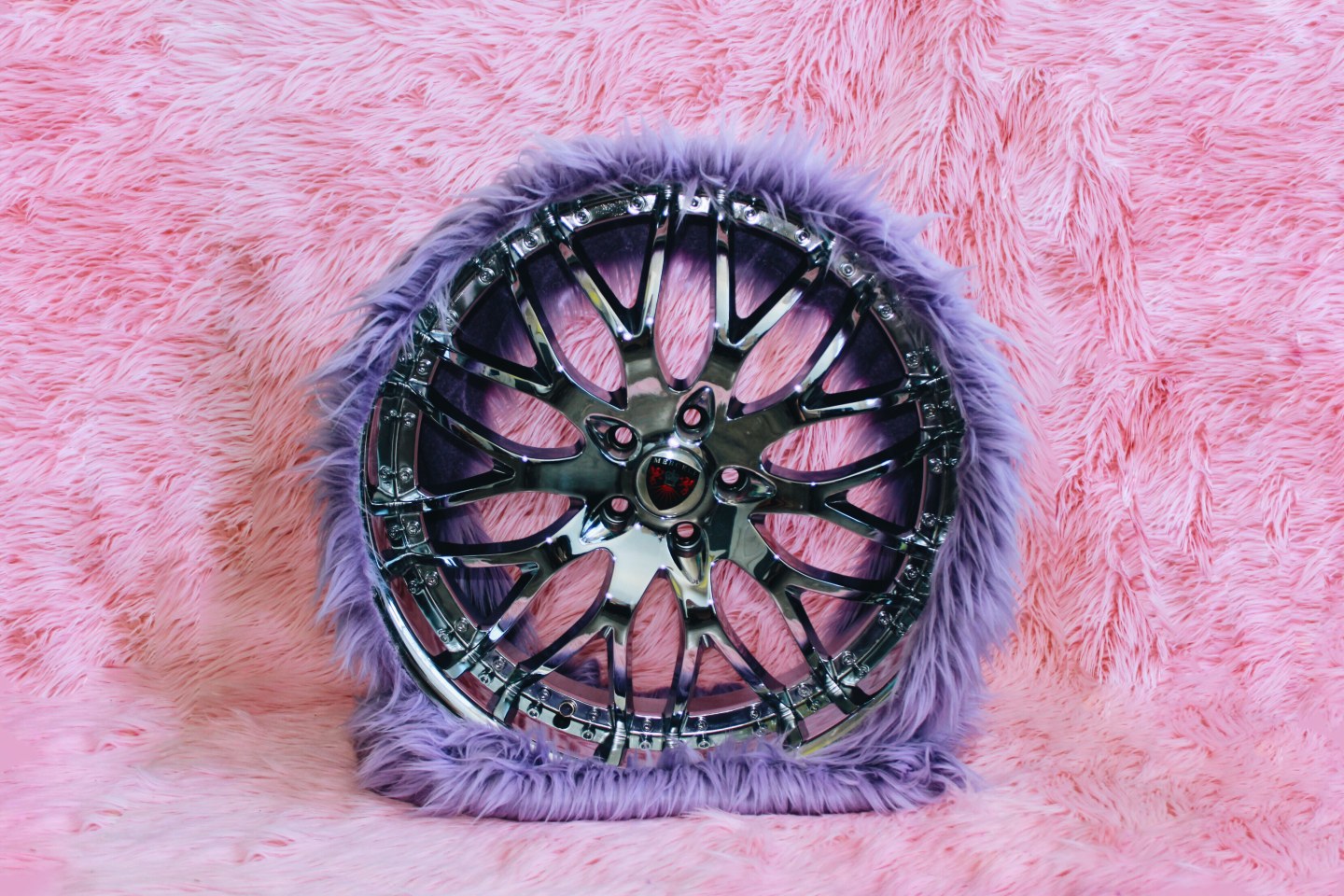 Artist Uzumaki Cepeda posing in earrings she created from faux fur.
Uzumaki Cepeda
Artist Uzumaki Cepeda posing in earrings she created from faux fur.
Uzumaki Cepeda
Black and brown people are not protected by this world. Gutsy artist Uzumaki Cepeda is using bright colored faux fur to craft safe spaces where we can be celebrated and let our guards down. In her striking installations, the ingenious 22 year-old turns objects like stoves, durags, and halos into plush cultural heirlooms — all speaking to a portion of a shared experience among folks across the diaspora. The hues of the fur echo the vibrancy of Cepeda’s Dominican heritage and the enduring legacy of her African roots. “I only photograph people of color,” she tells me over the phone from her new Los Angeles apartment about the portraits she includes in her offerings. Our stories, bodies, and lives are at the core of her fuzzy creations.
During that same thoughtful conversation we spoke about spirituality, the importance of cozy spaces for black and brown folks, and why her work centers women.
What first attracted you to work specifically with the fur? What's the significance that it has for you?
I just wanted to create a safe space for myself and for everybody else. I always wanted to create a room instead of just hanging something up on the wall. So, the fur installations were a good entry into that. And also, having a hard childhood I want to recreate it in a way that everyone's gonna become a kid when they step inside this room. It's all about safe space and feeling comfortable.
As women of color, we have to constantly navigate unsafe spaces. Why was it important for you to create a haven within your work?
As a woman of color who experienced the things that I've experienced, I didn't have a safe space. My dad was deported when I was like super young. My mother was by herself with three kids. My mom was constantly on the go, so with other people raising us, it was like our family structure wasn't there. We didn't have a safe space, my mom would try to but with having other people taking care of your kids, you don't know what the fuck they’re doing with your kids.
My dad is all the way in the Dominican Republic. He was deported because he was black. So it was like a constant war. Being a woman of color and finding your safe space because the only people who were providing safe spaces are other people of color.
At that age, it was really really hard to just be comfortable. My first language was Spanish so finding programs or other things that were just catered to us, it was really hard. That heavily influenced my work in a way where that's all I'm about. I'm all about safe space. I'm all about creating something where people feel comfortable and where I feel safe myself and feel proud of. Or I'm making somebody feel okay. That makes me feel really good.
 Uzumaki Cepeda
Uzumaki Cepeda
 Uzumaki Cepeda
Uzumaki Cepeda
It's comforting when I look at your work and see black and brown people portrayed with softness.
And having a soft place to go. I try my best to only photograph black and brown people and if I haven't they’re other people of color. I'm not that dark skinned and I acknowledge my own privilege. Colorism is real.
I want younger girls of color to look at the pictures and feel like they could relate because there's so many things that don’t, like the woman who stars in the movie Wonder Woman — she's white. It’s often images of people and things [girls of color] can't relate to.
And as a child, that shit sucks. Fuck that, I only photograph people of color. That's what I'm sticking to. And if people get offended, they get offended. Like, I don't give a fuck. This is my experience, this is my life and these are the people I'm catering to. It's not a problem that they're catering to a certain audience and why is it a problem that I'm only catering to one audience.
What's the power of specifically having women constantly at the forefront of your work?
It's super important because they already treat [women] like we're the bottom of the barrel. If you're a black woman, forget about it. I just feel like I have to elevate women, especially women of color. Making them my photo subjects is one of my main concerns, and also men of color too.
Also, like you said earlier, it softens the image of black and brown women. Like being a part of the art itself, you feel me. Our cultures so bright and we match it so well. The color pallette is all meant to be. My influence was bodegas, black culture in America, and the Dominican Republic.
 Merceli Rimz
Uzumaki Cepeda
Merceli Rimz
Uzumaki Cepeda
You put fur around objects like a durag or car rims — all things that speak to black experiences. What is it about that aspect of our culture that you trying to celebrate?
It's what made me who I am. Being from the Dominican Republic, an Afro-Dominican, I’m acknowledging the culture. It's pretty much like giving thanks. I feel like a lot of people steal from black culture but hate black people. Give thanks from where you get inspiration from. I'm not about photographing no fucking white girl in a damn durag. C'mon, like, what type of shit is that?
That rim, I have it in a certain part of my memory and I just recreated it in a way that now it's a whole other different shit. Dominican Republic is so diverse and shit. We are mixed with our oppressors. It's crazy being in the middle of that because our country has suffered a lot of racism and it’s embedded in our culture. So it's always good me being a Dominican woman and acknowledging my African roots.
Because a lot of Dominicans are brainwashed into thinking, "I'm not black." And then they'll be darker than me and I'll be like, "What are you talking about?"
It paints blackness to be like this terrible thing. When, really, it’s meant to be celebrated because all over the world black people suffer. Anyone that is of darker skin, they do suffer. Look at everywhere you go: in India's there's black people. China got fucking black people. Everywhere and in all of those places they get treated like shit. That's why it's only within my right to celebrate it.
 Uzumaki Cepeda
Uzumaki Cepeda
You also used a image of a bottle of Agua Florida in an installation. How’s that connect with your upbringing or spirituality? Why was that like something you had to include?
My art ties so much into my spirituality because it was so important to me as a child. That little bottle ties me back to being in DR when they were holding certain rituals. Seeing that brings back so many memories of practicing Vudú.
I feel like it made me be kind of not relatable to certain kids growing up because we couldn't talk about the same shit. When I went home I had to deal with being in my auntie's house, her channeling spirits, and doing all of that. Being in this huge room, super young, with the humongous altar.
The bottle used to be my mom’s. My mom used to practice the 21 Division. It’s a Hoodoo practice idea that's been kind of white-washed. The 21 Division was created in a way to hide the practice from our oppressor so it’ll have white images for that reason. It’s like Catholicism mixed in with Vudú. My mom always used that bottle so I kept it for myself. My art ties so much into my spirituality because ever since I was a little girl I was surrounded by Vudú and other practices. That's what I grew up on. Being on the island and seeing certain things and being exposed to it, I was digesting all that magic.